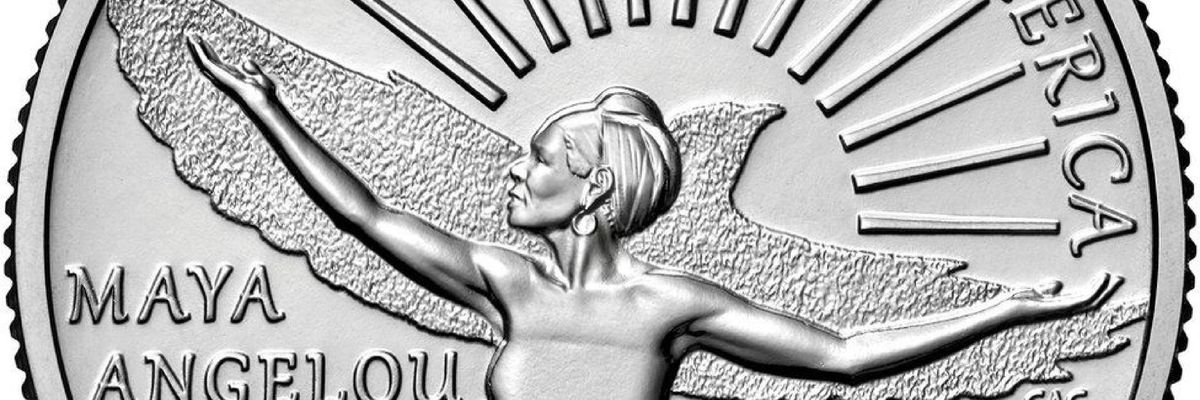
New Maya Angelous quarter released Monday by the U.S.Mint.
Still I Rise, Slightly: Maya Angelou Coin Released
After a decades-long fight - and, to be clear, amidst enduring, egregious inequities - a new U.S. quarter has begun life featuring the late poet, author and activist Maya Angelou, the first Black woman to appear on the coin. The Angelou tribute is the first in a program to feature iconic women, preferably of color, long ignored in a history and currency dominated by white, often slave-owning men. We take heart from her credo: When someone shows you who they are, believe them - and then work to change it. "You may trod me in the very dirt," she wrote. "But still, like dust, I'll rise."
After a decades-long fight - and, to be clear, amidst enduring, egregious inequities - the U.S. Mint has begun circulating a new quarter featuring the late poet, author and activist Maya Angelou, now the first Black woman to appear on the coin. The Angelou tribute is the first in an American Women Quarters Program aimed at honoring prominent women, preferably of color, long ignored in a history and currency dominated by old, white, often slave-owning men. Known for her lyrical writing and majestic voice, Angelou rose to fame after the publication of her seminal autobiography, "I Know Why the Caged Bird Sings," a harrowing account set in the segregated South of her brutal rape at the age of seven by her mother's boyfriend - a trauma that rendered her mute for six years. "There is no greater agony," she wrote much later, "than bearing an untold story inside you." Over time, Angelou won countless literary and humanitarian awards, including the Presidential Medal of Freedom, and was given over 50 honorary degrees. She died in 2014 at 86, having never ceased speaking her vivid truth: "You may write me down in history/With your bitter, twisted lies/You may trod me in the very dirt/But still, like dust, I'll rise."
The Women Quarters project is largely credited to California Rep. Barbara Lee, who after years of advocacy introduced the Circulating Collectible Coin Redesign Act of 2020; it passed last January. With Monday's release, she celebrated "the phenomenal women who shaped American history (who) have gone unrecognized for too long - especially women of color." There will be more, thanks to the Mint's invitation to the public to submit other entries: From now through 2025, the series will also feature Wilma Mankiller, the first female Cherokee chief; Adelina Otero-Warren, a New Mexico suffragette; Sally Ride, the first woman in space; and Anna May Wong, the first Chinese-American film star. "Each time we redesign our currency, (it says) something about our country - what we value and how we've progressed," said US Treasury Secretary Janet Yellen. Umm, yes and no, said Twitter. Many noted the new coin, echoing the Caged Bird, still has likely-slave-owner George Washington on the "heads" side; others asked where Harriet Tubman's long-awaited $20 bill is, or noted the country's still-raging misogyny, or suggested half a new coin is like a male boss giving a 40-cent raise and congratulating himself on your "empowerment." We take heart from Angelou. "When people show you who they are the first time, believe them," she famously wrote. Then, "When you don't like a thing...change it."
An Urgent Message From Our Co-Founder
Dear Common Dreams reader, The U.S. is on a fast track to authoritarianism like nothing I've ever seen. Meanwhile, corporate news outlets are utterly capitulating to Trump, twisting their coverage to avoid drawing his ire while lining up to stuff cash in his pockets. That's why I believe that Common Dreams is doing the best and most consequential reporting that we've ever done. Our small but mighty team is a progressive reporting powerhouse, covering the news every day that the corporate media never will. Our mission has always been simple: To inform. To inspire. And to ignite change for the common good. Now here's the key piece that I want all our readers to understand: None of this would be possible without your financial support. That's not just some fundraising cliche. It's the absolute and literal truth. We don't accept corporate advertising and never will. We don't have a paywall because we don't think people should be blocked from critical news based on their ability to pay. Everything we do is funded by the donations of readers like you. Will you donate now to help power the nonprofit, independent reporting of Common Dreams? Thank you for being a vital member of our community. Together, we can keep independent journalism alive when it’s needed most. - Craig Brown, Co-founder |
After a decades-long fight - and, to be clear, amidst enduring, egregious inequities - the U.S. Mint has begun circulating a new quarter featuring the late poet, author and activist Maya Angelou, now the first Black woman to appear on the coin. The Angelou tribute is the first in an American Women Quarters Program aimed at honoring prominent women, preferably of color, long ignored in a history and currency dominated by old, white, often slave-owning men. Known for her lyrical writing and majestic voice, Angelou rose to fame after the publication of her seminal autobiography, "I Know Why the Caged Bird Sings," a harrowing account set in the segregated South of her brutal rape at the age of seven by her mother's boyfriend - a trauma that rendered her mute for six years. "There is no greater agony," she wrote much later, "than bearing an untold story inside you." Over time, Angelou won countless literary and humanitarian awards, including the Presidential Medal of Freedom, and was given over 50 honorary degrees. She died in 2014 at 86, having never ceased speaking her vivid truth: "You may write me down in history/With your bitter, twisted lies/You may trod me in the very dirt/But still, like dust, I'll rise."
The Women Quarters project is largely credited to California Rep. Barbara Lee, who after years of advocacy introduced the Circulating Collectible Coin Redesign Act of 2020; it passed last January. With Monday's release, she celebrated "the phenomenal women who shaped American history (who) have gone unrecognized for too long - especially women of color." There will be more, thanks to the Mint's invitation to the public to submit other entries: From now through 2025, the series will also feature Wilma Mankiller, the first female Cherokee chief; Adelina Otero-Warren, a New Mexico suffragette; Sally Ride, the first woman in space; and Anna May Wong, the first Chinese-American film star. "Each time we redesign our currency, (it says) something about our country - what we value and how we've progressed," said US Treasury Secretary Janet Yellen. Umm, yes and no, said Twitter. Many noted the new coin, echoing the Caged Bird, still has likely-slave-owner George Washington on the "heads" side; others asked where Harriet Tubman's long-awaited $20 bill is, or noted the country's still-raging misogyny, or suggested half a new coin is like a male boss giving a 40-cent raise and congratulating himself on your "empowerment." We take heart from Angelou. "When people show you who they are the first time, believe them," she famously wrote. Then, "When you don't like a thing...change it."
After a decades-long fight - and, to be clear, amidst enduring, egregious inequities - the U.S. Mint has begun circulating a new quarter featuring the late poet, author and activist Maya Angelou, now the first Black woman to appear on the coin. The Angelou tribute is the first in an American Women Quarters Program aimed at honoring prominent women, preferably of color, long ignored in a history and currency dominated by old, white, often slave-owning men. Known for her lyrical writing and majestic voice, Angelou rose to fame after the publication of her seminal autobiography, "I Know Why the Caged Bird Sings," a harrowing account set in the segregated South of her brutal rape at the age of seven by her mother's boyfriend - a trauma that rendered her mute for six years. "There is no greater agony," she wrote much later, "than bearing an untold story inside you." Over time, Angelou won countless literary and humanitarian awards, including the Presidential Medal of Freedom, and was given over 50 honorary degrees. She died in 2014 at 86, having never ceased speaking her vivid truth: "You may write me down in history/With your bitter, twisted lies/You may trod me in the very dirt/But still, like dust, I'll rise."
The Women Quarters project is largely credited to California Rep. Barbara Lee, who after years of advocacy introduced the Circulating Collectible Coin Redesign Act of 2020; it passed last January. With Monday's release, she celebrated "the phenomenal women who shaped American history (who) have gone unrecognized for too long - especially women of color." There will be more, thanks to the Mint's invitation to the public to submit other entries: From now through 2025, the series will also feature Wilma Mankiller, the first female Cherokee chief; Adelina Otero-Warren, a New Mexico suffragette; Sally Ride, the first woman in space; and Anna May Wong, the first Chinese-American film star. "Each time we redesign our currency, (it says) something about our country - what we value and how we've progressed," said US Treasury Secretary Janet Yellen. Umm, yes and no, said Twitter. Many noted the new coin, echoing the Caged Bird, still has likely-slave-owner George Washington on the "heads" side; others asked where Harriet Tubman's long-awaited $20 bill is, or noted the country's still-raging misogyny, or suggested half a new coin is like a male boss giving a 40-cent raise and congratulating himself on your "empowerment." We take heart from Angelou. "When people show you who they are the first time, believe them," she famously wrote. Then, "When you don't like a thing...change it."

